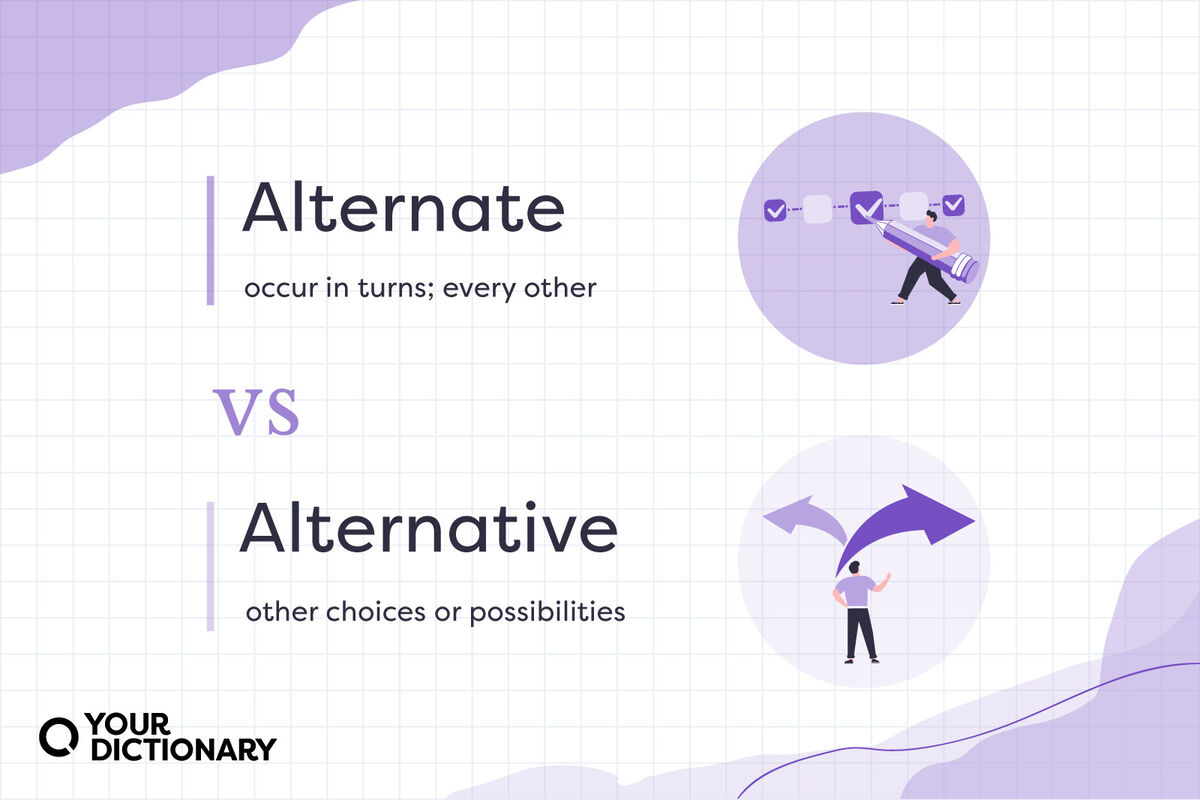
You may think you can use alternate and alternative synonymously. However, while there is overlap between them, alternate and alternative have distinct meanings and uses.
The Difference Between Alternate and Alternative
Alternate and alternative are understandably confused and can be used interchangeably in certain contexts, but it is important to note that they can have different meanings that apply to different situations.
-
alternate - occur in turns; every other
-
alternative - other choices or possibilities
Meaning and Usage of Alternate
Alternate comes from the Latin word alter, meaning “other.” This word evolved into alternus (“every other”), alternat (“done by turns”) and finally alternate, which means “every other” or “occurring or succeeding in turns”.
The meaning and pronunciation of alternate changes slightly depending on how you use it and the part of speech. As an adjective, it is pronounced awl-ter-nit and means “every other” or “occuring in turns.” As a noun, alternate is used synonymously with alternative to mean “other” or “a replacement for something or someone.” This is also pronounced awl-ter-net. In its verb form, it is pronounced awl-ter-nāt and means “to do something by turns.”
-
We took an alternate route home. (adjective)
-
Sometimes I feel like I’m in an alternate reality. (adjective)
-
They selected the jurors as well as two alternates. (noun)
-
The alternate went on in place of the lead actor. (noun)
-
The layers of the cake alternate between chocolate and vanilla. (verb)
-
I alternate between sleepy and wide awake. (verb)
How to Use Alternative in Context
As an adjective, alternative (pronounced awl-tur-nuh-tiv) means “a choice between two or more things” or “another possibility.” The latter meaning can refer to things like alternative music and alternative medicine to indicate they are an alternate to mainstream music or medicine. In its noun form, alternative is pronounced the same way and also means “two or more choices.” The difference comes down to its placement and part of speech in the sentence.
-
He listens to alternative music. (adjective)
-
Is there an alternative route to your house? (adjective)
-
We had no alternative but to keep going. (noun)
-
The best alternative to going out is hanging out with friends at home. (noun)
When to Use Alternate and Alternative Interchangeably
Alternate and alternative can sometimes be used synonymously when referring to something “other,” whether that is another option or something different.
-
We took an alternate/alternative route home. (adjective)
-
Sometimes I feel like I’m in an alternate/alternative reality. (adjective)
-
I scanned the radio looking for an alternate/alternative station. (adjective)
Words with Alternate Spellings
As with other similar words, alternate and alternative are often used interchangeably. However, while their meanings are somewhat similar, it is important to remember that alternate refers to something that occurs in turns and alternative means another choice or way of doing something. While you're here, check out words like preventative and preventive and continually and continuously—explore the differences between these terms and how to use them in a sentence.